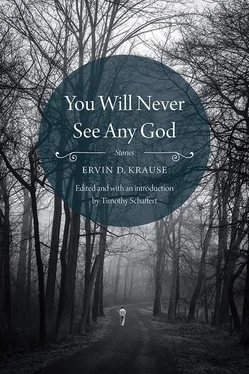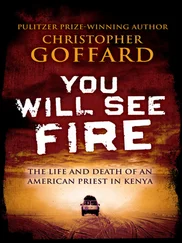The day was clear, with an icicle-blue clearness, and the frigid sun huddled not far above the horizon, surrounded in its rainbow of sun dogs. At the hilltop, a half-mile from the place, the wind was like frozen stilettos in my eyes and on my face and it took my breath away. The wind howled fiercely out of the northwest, carrying the snow and the cold with it. I was dressed warmly, wrapped in sheepskin to my eyes, but the cold was still vicious. The hill was long, dividing the field into two nearly equal halves, and the half I crossed to took up a quarter-section of land itself. The field had once been an entire farm, but the farmstead now lay abandoned and gray, surrounded by the thistle-like trees in one corner of the land, not far from the schoolhouse, which too had long since been boarded-up and abandoned.
Across the long hollow, beside the schoolhouse, I saw a patch of green, metallic and shiny, and there were drifts all around the gray building. It was too cold to think well, and the oddness of that bright color made no impression on me at first. I saw the two calves huddled in a hollow, under the lip of a snow bank, not far away, and I ran down there, and I pulled the calves up roughly, because I knew their lives depended on moving quickly. They were without energy and I pushed them along ahead of me to the hilltop, slapping them with my hands, and they huddled their frail backs with the wind and finally they began to scamper off towards the place.
I wondered at the greenness, and I looked across the long valley at the schoolhouse. It was difficult to see against that piercing glare of the sun on the glazed white snow and against the wind. The green metal was there, obliterated at moments by the blowing snow. It was a fallen shutter, I thought at first, but I knew there were no metal shutters there, and no signs blown in on that isolated road and by that building. I knew I would have to go down there.
It was hard going, and the hollow was drifted up, and I kept breaking through the crust of the snow. I came up from the hollow, sinking in the deep snow and struggling through it, and the wind was vicious, and the cold sank into me, like fangs. I crossed the bedraggled schoolyard fence. There had once been many trees around the schoolhouse, but only grass and weeds grew there anymore, and there were two old box elder trees, near dying, and two already dead and fallen over, and one small evergreen, and a covey of plum brush which nothing could kill. The building itself was ratty and tattered, and some of the shingles had come off and the boards hung loosely from the black windows. The snow was drifted deeply around the schoolhouse, and the roof was swept clear by the wind.
I circled the building warily, for even in my chilled mind I was a little afraid. It was as I had guessed; there was no shutter there, no sign blown down. A car was parked beside the building, out of the northwest wind, and the snow had blown in, drifting over the front of the car. It was the green metal side of the automobile that I had seen from the hilltop. I hesitated, and then I kicked through the deep snow to the car. The front of the car and the side of it near the building were covered over with hard but fragile-looking little curlicues of wind-shaped snow. The snow was as clean and brilliant white as a wedding veil. The windows of the car were frosted over from the inside, and I knew that meant that someone had been within the car when it was freezing out, and the moisture had condensed and frozen on the windows. I was frightened, and I slapped my mittened hands together. I knew the car had not been there the previous evening, for the snow had only begun then, and I had brought the tractor down across the stubble, herding the cattle back to the barns, and nothing had been there. The car had come in the night, when the wind was still blowing the dirt country road clear. Perhaps the people in the car had set out on foot, I thought; I hoped they had, for there was nothing that could live long in that weather.
I rubbed the glass gingerly, but the frost was inside, I remembered stupidly, and then, through the fragile, laced frost at the edges of the glass, I saw the clump on the front seat, and I knew then, even in my frozen brain, what had happened. I shouted and I beat upon the window. I tried the door but it was locked. Nothing moved.
I wore heavy leather mittens and I hit the window once, twice, three times, and the window smashed, shattering glass and the window frost into the car, and I reached in and opened the door.
A man and a woman were on the front seat and they were in an embrace, and they were dead. A blanket was pulled up over part of them. There was a quick coldness in my belly and I was afraid I would vomit, but I did not. I did not look again at them, then. I pulled the blanket farther over them both, hiding the heads, and then I heard the little buzzing sound. The ignition was on. I reached in carefully, over the two, not touching them, and turned the keys off. They had come there in the night, I thought, and because it was cold they had left the motor and the heater run, and the gas had been drawn in and the odorless monoxide covered and suffocated them, before the storm and the cold had penetrated the car. The engine had run until all the gasoline was gone.
I was trembling and I closed the door and took a few steps away, and I could not think of anything, and then I was driven back to the car because I could not believe it. It was as if I had fallen somewhere in that bitter cold and was freezing to death and I was dreaming it all. I opened the door once more. They were there, and I knew them. The woman was Mathilda Heron, the wife of a farmer who lived not far away, and the man was Conrad Wenzel, a young man not yet thirty, who was new in the town and who was a teacher in the junior high school.
I slammed the door hard and I ran and the wind lashed, prickly and cold, against the backs of my legs, and even though I fell several times in that deep and treacherous snow, I did not stop running. The hill was long, and the ice-air clutched at my lungs, and each breath became a cold and bitter agony, like teeth clamped into my chest, but I could not stop running.
My brother was waiting for me and he was standing in the warmth where the cattle were feeding, and I leaned, sweating and cold, against the board fence, and I told him what I had seen.
He blinked and he struck his forehead with his hand and asked me twice if I was sure, and I nodded each time. He swore and shook his head and said the sheriff would have to be called.
“The sheriff will have to come quickly,” I said.
“Why?” my brother asked. “They won’t move from the car.”
“They don’t matter,” I said. “Everybody else will find out if it isn’t done quietly and quickly.”
My brother shrugged his shoulders, and he looked at me as if to ask what else we could do. It was not our affair, and there was nothing either of us could do about it.
“Yes, all right,” I said. “Call the sheriff.”
We went up to the house where it was warm, and my brother placed the call, and while he waited for the sheriff to come to the phone, we looked at each other, and we both knew what it meant in that country, with the party lines and all the men sitting at home in front of their stoves, gathering reports from their telephone-listening wives. My brother tried to tell the sheriff to simply come out, but the sheriff, too, could see the weather; and it was eighteen miles from the county seat to our place, and so finally my brother had to tell him angrily that there were two dead people in a car, and the sheriff asked him if he knew who they were, and my brother said “no,” and hung up. We knew then that the whole neighborhood, the whole town, would know within a matter of hours, would hungrily feed on the details, in the way that starved cats pull at the entrails of fish until they had them all.
Читать дальше











